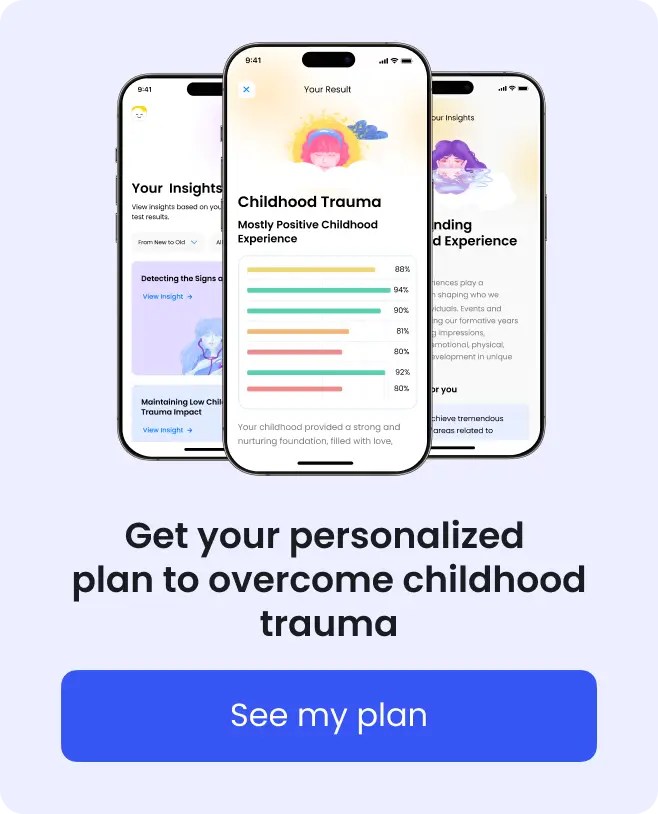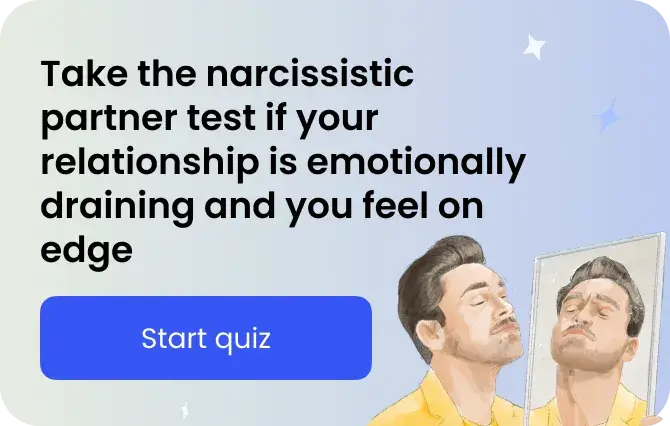You may be hard on yourself, constantly blame yourself for everything, and truly think that you don’t deserve love. If such thoughts arise in your head from time to time, you’ve gotten in a loop of self-loathing, and it can be more serious than it seems.
In this article, we’ll delve into the meaning of self-loathing and understand why you can feel this way. Keep reading to explore the signs of negative thoughts and how to overcome self-criticism for good.
What is self-loathing?
Self-loathing is a pattern of thoughts that makes people feel worthless, miserable, and ashamed. This can lead to a total belief that a person doesn’t deserve anything positive, which influences all areas of life.
This can happen because of a strong inner critic that makes people struggle even over the most minor mistakes. A low self-worth is one more cause of self-loathing. Here are some statements people experiencing self-hate may resonate with:
- “I’m worthless.”
- “I’m a failure.”
- “Nobody could ever love me.”
- “I don’t deserve happiness.”
- “If people really knew me, they would be horrified.”
- “I hate myself so much, and it hurts.”
These expressions of emotional pain come from extreme self-criticism and the belief that you’re not good enough. But you are! Everyone is important, valuable, and good enough, no matter what.
Understanding what happens will help you take the first steps to emotional resilience. Try self-discovery tests from Breeze to get personalized insights on how to feel better.
Is it normal to hate yourself and think that you’re a bad person?
Feeling guilty or frustrated occasionally is normal, and everyone may experience it from time to time. However, self-loathing is an alarming sign that something is off. It can signal severe physical and mental health problems, like eating disorders, depression, anxiety disorders, and more. Furthermore, harsh inner criticism can significantly influence your well-being and quality of life.
What causes self-loathing? 10 reasons for negative self-talk
Negative thought patterns may stem from childhood experiences, current life challenges, or underlying mental health conditions. Let’s explore the most common causes in detail.
1. Childhood trauma
When children face traumatic events, they may later have challenges with their self-worth and develop self-loathing thoughts. [1] In particular,
- If parents were neglectful or unsafe, children may try to internalize this behavior by believing that they deserved this approach. This way, they try to make sense of trauma and rationalize their feelings.
- If children grow up with narcissistic parents, they might develop golden child or scapegoat syndrome and believe that they are never doing enough.
- Experiencing emotional abuse can lead to an unstable self-image and a lack of self-compassion.
It often starts with “I can’t remember my childhood” and finishes with something much deeper than memory problems. To understand what causes self-hatred and analyze your unique path, take Breeze’s test. It will help you discover the point you are now and create a roadmap to healing from childhood trauma.
2. Body dysmorphia
Body dysmorphia is one of the main causes of eating disorders and internalized fatphobia. As well as our physical health, these disorders can erode our self-esteem and internal support. They’re also often connected with the feeling of self-loathing.
Sometimes, the cause-and-effect relationship may be the opposite. Self-hate can lead to destructive attempts to control eating habits as a coping mechanism. As a result, a person may develop an eating disorder and body image issues that only exacerbate the feeling of “I hate who I am.”
Don’t hesitate to seek support from a therapist if you feel that the situation gets out of control. It’s better to take care of your mental health now to avoid potentially worsening issues in the future.
3. Toxic relationships
Gaslighting, manipulation, or any sign of abuse may create the critical voice inside your head. If you live with someone who blames you for everything or makes you “deserve” love and attention, you may start to believe their words.
Not only a partner but also a friend, co-worker, or even a relative may be toxic. So, being aware of your circle and limiting communication with such people is vital.
4. Low self-esteem
Hating yourself may come from a negative self-concept and poor self-image. People with low self-esteem struggle to believe that they and their opinions are important and feel so empty that they can’t find joy in their accomplishments or appreciate their worth. They also tend to feel inferior to others. It may stem from:
- Repressed childhood trauma
- Bullying at school or college
- Stressful breakdown
- Financial troubles
- Relationship issues, etc.
Imagine that you’ve started a fashion brand. Everything went well until one day, you got a bad review. For a person with unstable self-esteem, it can turn into a downward spiral of thoughts, from “I need to close the brand” to “People hate me.” Even the slightest problem can lead to self-loathing.
Nicole Arzt, LMFT, adds, “You are important, and you have inherent worth. You also add value to this world and to the people in your life. Try to remind yourself of this as often as possible.”
5. Mental illnesses
Several mental health conditions can lead to negative thoughts as well. Some of them, like depression, can distort self-perception. And others, like anxiety disorders or OCD, may fuel constant self-criticism and fear of making mistakes.
- Depression
- Schizophrenia
- Anxiety disorders
- Obsessive-compulsive disorder (OCD)
- Post-traumatic stress disorder (PTSD)
- ADHD self-loathing
- Substance use disorders
- Borderline personality disorder (BPD)
If you suspect the symptoms of any mental health condition and want to understand where the feeling of self-resentment comes from, contact your healthcare provider.
6. Constant stress
Continuous stress and personal struggles may also lead to negative self-perception, as they make your inner critic louder. [2] Take a look at the list and consider whether you experience something similar. If yes, it can be one of the reasons why you feel bad about yourself.
- Physical health problems
- Work-related stress
- Social isolation or loneliness
- Loss or grief
- Lack of support from friends or family
- Fear of failure or rejection
7. Feeling guilty over your past
Mistakes are a part of life, and they can often teach us valuable lessons. But while some of us step aside, draw conclusions, and forget about it, others may dwell on past errors. It’s easy to fall into a cycle of self-hatred if you run them through your head again and again.
8. Lack of self-care and self-compassion
If you don’t know how to take care of your mental and physical state, it might make it more difficult to appreciate your worth. [3] Here are some of the behaviors you should avoid:
- Placing others’ needs higher than our own.
- Setting too high standards and trying to reach the ideal, no matter what.
- Ignoring basic needs like sleep, rest, or regular meals.
- Constantly pushing yourself through exhaustion or burnout.
- Speaking to yourself harshly instead of offering understanding.
9. Comparing yourself to others
In the era of social media, comparing yourself to Insta-models, YouTube bloggers, or TikTok influencers can easily become a habit. It seems like they are richer, more beautiful, and more successful.
But the truth is that social media platforms allow people to show only the positive sides of their lives. And while you compare yourself to this perfect picture, it’s easy to fall into thoughts like, “I’m not enough.”
10. Perfectionism
Some people easily accept that there are ups and downs, and it doesn’t make them feel bad about themselves. However, others take such moments to heart. For instance, if you feel like a failure because of a minor mistake, you may start to believe you’re a failure, even though it isn’t true.
For perfectionists, a bad day can feel like a reflection of their worth, and even small setbacks can trigger intense sadness or anxiety and lead to a cycle of self-criticism.

6 signs of self-hate
Some of the most common signs of self-loathing include unrealistic expectations, lack of self-love, overgeneralization, and catastrophization.
1. Black-and-white thinking
Self-loathing can make people turn to extremes and believe that “If it’s not a 100% success, it’s a failure.” You may think that the world is only white or black, and people are only good or bad.
If you don’t give room for any shades of gray or other colors in your life, it’s a warning sign. Moreover, it can make you constantly dwell on past mistakes, believing you’ve already ruined everything.
2. Catastrophizing
You always believe the worst possible scenario will happen, even if it’s unlikely or almost impossible. This mindset could result in the ultimate statement, “I hate myself,” as you feel powerless to prevent all bad things. Even the most minor trigger can turn into a possible nightmare in your head.
For instance, your manager unexpectedly booked you an additional 1:1 meeting. You try to guess every possible scenario three days before the event and suppose that you made a significant mistake and will be fired. The meeting happens, and the manager clarifies some changes in processes within the team. “Oh, I shouldn’t have been disappointed in myself,” you think. But the new day comes, and everything goes over.
3. Overgeneralization
If people who don’t feel confident have already had a bad experience, they can assume it will recur in other situations. It feels like, “Nothing good is going to happen.” Due to overgeneralization, even the slightest failure can stop you from doing things you like.
Imagine that you start going to the gym. Every single training session feels challenging, but you keep going. Until one day, you need to skip the gym because of work. Two days later, you need to do it again because you feel sick. People who experience overgeneralization may start believing that they’ll never be disciplined.
4. Focusing on the negative and ignoring the positive things
Self-hating people may see the world as a dangerous and scary place, no matter what happens around them. So, if you perceive everything only from the negative side and don’t see things getting better, it may be a noticeable sign.
5. Emotional reasoning
Some people may think that self-hate is good because it makes them more careful and attentive. They can assume that being harsh on themselves prevents mistakes or failure and may think something like:
- “I can’t relax yet.”
- “I need to be tougher on myself.”
- “Letting go feels risky.”
- “This keeps me focused.”
- “I shouldn’t get too comfortable.”
But in reality, this approach only leads to constant stress and anxiety without any real reason.
6. Seeking approval
Some people want to feel appreciated. Nevertheless, when self-loathing arises, external support can become the only thing that drives you in life. People who experience self-loathing may:
- Try to fit in, but quite rarely feel at ease.
- Need validation and approval, as if others’ opinions are much more important than their own.
- May have unstable self-esteem that varies based on how people interact with them.
How to stop hating yourself and take care of your mental health?
To improve self-esteem and stop worrying about negative emotions, it may be helpful to start doing self-support techniques. Here are some of the most effective:
1. Talk to your inner critic
Once you understand what causes your self-hatred, it may be easier to start seeing yourself in a more positive light. The next significant step is to stop defining yourself by your flaws or mistakes.
Here’s a comment from Reddit that’s worth reading: “That seems to be negative self-talk, just a reminder: you cannot improve yourself if you criticize yourself. Start with writing things you love about yourself, start with practicing thankfulness, and think about people who love you.”
Try gratitude journaling from Breeze. This simple practice can help you notice more positive aspects of your day and gradually soften your inner critic by reminding you that you’re more than your mistakes.
[gratitude journal]
2. Focus on the small wins instead of negative thoughts
Everything you do to feel better and stop thinking, “I hate being me,” deserves celebration. Any positive look in the mirror, a compliment you truly accept, or a “no” when you don’t want to do something is a big achievement.
It’s better to start by identifying small ways to care for yourself, like:
- Setting aside time for your hobbies
- Trying mindfulness
- Acknowledging your feelings without judgment
- Spending more time with people you love
3. Reframe self-hatred thoughts
This CBT practice can help you recognize unhelpful patterns and approach yourself with more self-respect. This is how to do it:
- Catch a self-loathing thought and write it down. For instance, “I’m an awful person because I rest too much.”
- Check the facts. Think about whether it really should make you feel bad.
- Consider other explanations. Resting helps you stay healthy and more energetic for productive work.
- Replace the thought with a balanced one. “Taking breaks doesn’t make me a bad person. It helps me function better.”
- Write a new thought down and repeat the process anytime other negative thoughts appear.
4. Give yourself the same kindness you’d show to a good friend
Self-loathing stops when positive self-talk enters the room. You shouldn’t only say good things about yourself, but you should also do good things for yourself and truly believe that you deserve them.
- Take a break (5-10 minutes) when you notice that you’re tired.
- Unfollow accounts that trigger comparison.
- Reschedule one non-essential task when you’re overwhelmed.
- Ask for help or reach out to a support group.
Expert Insight
“Self-loathing can be insidious and difficult to overcome. Many people are so used to being critical of themselves that kindness feels foreign. That said, practicing self-compassion can go such a long way in building a healthier relationship with yourself.”
Nicole Arzt
Mental health professional
“Why do I hate myself?” test
Please choose the option for each question that resonates with you the most. Once you’re done, tally up how many times you selected each letter.
1. When you look back on your childhood, what do you see?
A) It was so painful that I don’t even want to remember.
B) My warm and hurtful memories are mostly connected with food. I remember the most festive dinners and arguments over a family table.
C) I can’t even say. Now I’m drained from constant arguments, and my childhood seems like something from my previous life.
D) I remember my classmates making fun of me. It felt like I was always on the outside, struggling to fit in.
E) It’s difficult to say. I’m usually too exhausted to think about this kind of stuff.
2. What do you think about when you look in the mirror?
A) I may look normal, but my heart handles sadness from the past.
B) I often focus on my body, wishing I could change it ASAP.
C) I see a person who only wants love, care, and support.
D) Appreciating my appearance is difficult, and I harshly criticize myself.
E) I feel a mix of sadness and hopelessness when I look in the mirror.
3. Do you struggle with your body image?
A) Not really. I’ve come to terms with my body over time.
B) Yes, I often find myself comparing myself to those Instagram models.
C) It depends heavily on my partner. If I receive compliments regularly, I feel OK. But if I get criticized, it can completely throw me off.
D) Yes. I don’t like myself, no matter how I look.
E) No. I want it to help me live a fulfilling life, but sometimes it lets me down.
4. How do you feel about your relationships with people around you?
A) I feel distant from my family and often question our connections.
B) I feel judged by others, which makes me hesitant to open up.
C) I suppose my partner is toxic, but I can’t leave them.
D) I don’t feel worthy of love and push people away to avoid rejection.
E) I feel isolated and alone, even when standing in the middle of the crowd at a concert.
5. How do you usually treat yourself when you feel down?
A) I ignore my feelings and think they’ll go away on their own.
B) I may buy some sweets and overeat or, on the contrary, decide on another hunger strike.
C) I turn to other people. However, some of them can make me feel even worse than before.
D) I tell myself I’m not worth the effort, which only deepens my sadness.
E) I withdraw from everything and everyone.
Results of the self-criticism test
It’s impossible to cover every reason you might struggle with self-acceptance in just one quiz. Instead, we’ve highlighted the most common options.
- Most A. The cause of your negative thinking patterns may lie in critical parents and childhood trauma.
- Most B. You might experience self-loathing because of body dysmorphia.
- Most C. Toxic and abusive relations with partners can make you hate yourself.
- Most D. The cause of self-loathing thoughts may be low self-esteem.
- Most E. Your self-hate can stem from feeling helpless or powerless.
To sum up
When experiencing overwhelming self-hate, it’s crucial to find a helping hand that will navigate you through life’s challenges. You may try self-help techniques, ask loved ones for support, or work with a therapist. There are many worthwhile ways to build emotional resilience.
Stay attentive to your well-being with Breeze, and try self-discovery tests and a mood tracker to learn more about what can trigger self-loathing thoughts. Let’s start the journey to happiness together. The result is worth it.
Sources
- Clinical Psychology & Psychotherapy. “Childhood maltreatment and self-hatred as distinguishing characteristics of psychiatric patients with self-harm: A comparison with clinical and healthy controls.” 2022
- Kotera Y, Dosedlova J, Andrzejewski D, Kaluzeviciute G, Sakai M. “From Stress to Psychopathology: Relationship with Self-Reassurance and Self-Criticism in Czech University Students.” Int J Ment Health Addict. 2022
- O’Loughlin EK, Marashi M, Beer S, Sabiston CM, Nesbitt AE, O’Rourke RH, Sylvestre MP, O’Loughlin JL. “Factors associated with low self-compassion in young adults.” Can J Public Health. 2025
Disclaimer
This article is for general informative and self-discovery purposes only. It should not replace expert guidance from professionals.
Any action you take in response to the information in this article, whether directly or indirectly, is solely your responsibility and is done at your own risk. Breeze content team and its mental health experts disclaim any liability, loss, or risk, personal, professional, or otherwise, which may result from the use and/or application of any content.
Always consult your doctor or other certified health practitioner with any medical questions or concerns
Breeze articles exclusively cite trusted sources, such as academic research institutions and medical associations, including research and studies from PubMed, ResearchGate, or similar databases. Examine our subject-matter editors and editorial process to see how we verify facts and maintain the accuracy, reliability, and trustworthiness of our material.
Was this article helpful?







